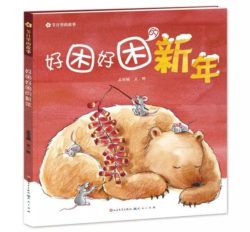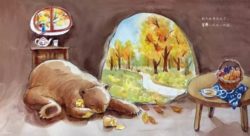The 6th Bai Meigui Translation Competition: Picture Book
The 6th Bai Meigui Translation Competition results are in!
We were delighted to announce the winners of our 2nd competition exclusively for school pupils:-
1st place: Izzy Hasson, Benenden School, Kent
2nd place: Chong Pin Shin, River Valley High School, Singapore
3rd place: Zoe Lambert, City of London School for Girls
After receiving mentoring from Helen Wang, current holder of the Marsh Award for Children's Literature in Translation, the winning entry will be published later this year as a bilingual picture book, with Balestier Press -- we are hoping for an online launch by Singapore Book Council in September -- but watch this space for updates!
While we are unable to give individual feedback to all the entrants, here are some general comments from our judges:-
"We were very impressed by all the translations we read. Picture books may look easy, but they can be incredibly difficult to translate. The text and illustrations work together – often an adult will read the story aloud, while a child listens and reads the story through the pictures. The storytelling and language are particularly important – there is onomatopoeia, repetition, humour, and, perhaps most challenging of all in this book, the culturally specific things that are so familiar to Chinese readers but may be completely new to many English-readers.
Our translators had to think carefully and creatively from the very first page. In Chinese the bear’s name is Bao Xiong; some of our translators kept the pinyin name, others chose Treasure Bear (a direct translation), Teddy, Honey Bear, Bao Bear, Bao Bun Bear, Po the Bear, Caspar [34] (Persian, for treasure keeper) and Ruby [51]. Is the bear male or female? The Chinese text doesn’t say, but English forces us to choose a gendered pronoun. Then there are the ingot-shaped jiaozi (dumplings?), the spring couplets (banners?), the paper-cuts for the windows (decorations?), the suona (trumpet?), all the terms for Chinese New Year, and the Chinese writing in the pictures (“Forest-pedia”[28] was a great suggestion). Decisions, decisions…"
Specific selected comments on our three winning entries (NB: all entries were anonymised before passing to the panel):-
First Prize: No. 3 (Izzy Hasson)
"I was looking for competent translations, plus translations that “touched” me (eg made me smile) or that tackled the difficult/culturally specific parts well or showed a creative thinker. I was looking for a translator that I “felt” I could work with towards a final version. My overall favourite was no. 3, because there was something about it that made me smile."
"Despite some minor issues with accuracy, I felt no. 3 delivered what came closest to the cadence of an engaging children’s book. There was something light about the prose, and would have sounded enjoyable when read aloud."
Second Prize: No. 27 (Chong Pin Shin)
"I commend No. 27 for its sharp grasp of the meaning of the original Chinese text."
Third Prize: No. 49 (Zoe Lambert)
"Translating onomatopoeia is always a challenge. The writer here managed to do so in a way that retained a certain Chinese-ness while making the story more accessible for wider audiences. Overall, it was also a thoughtful and charming attempt."
Many congratulations to all our winners, schools, and to everyone who took part. And huge thanks, also, to our judges for completing a formidable task, particularly under lockdown!
We are happy to announce that - following the success of our first picture book competition in 2018 - our competition this year will again be open exclusively to students in secondary education (between 11 and 18 years old), and will be run in partnership with the Singapore Book Council and Balestier Press. It's free to enter (the link is at the bottom of this page), so if you are learning Chinese at school this could be a fantastic opportunity.
Our text is once again written and illustrated by acclaimed author Meng Yanan 孟亚楠, winner of China's 2016 Bronze and Sunflower Picture Book Award. We hope you enjoy it as much as we do!
(And if you're hesitating, or if you need more inspiration, read what the winner of our last picture book translation - Jasmine Alexander - has to say about her own experience!)
To open the book and start translating, please click on the image of the book cover below.
Meng Yanan has very kindly made an audio-recording of this story specially for the competition. Click on the picture below to listen!
As well as translating the story, we would like you to include with your translation a short piece of writing (in English, maximum 400 words) answering the questions in italics below and explaining your reasons.
Imagine you are presenting your translated story to an audience who knows nothing about China. What information about Chinese culture would you need to tell them? Were there any specific choices you made in your translation to adapt it for the needs of an English-language reader? If so note these and explain your reasons.
If appropriate, this piece of writing may be included as a translator's preface in the final publication.
The Prize
The winning entry will have the chance to be mentored by award-winning translator Helen Wang, and to see their translation published in a bilingual edition of the text by Balestier Press. The winner will be formally announced in May, and the winning translation will be featured in a special programme at the Asian Festival of Children's Content (AFCC) Singapore (please note that the original timing of this event has now changed, but we will keep you updated as plans progress). The winning book will be marketed at the festival, and to schools and libraries throughout the UK, Singapore, and worldwide.
The Judges
We're honoured to have a panel of award-winning translators and experts on children's fiction to judge our competition.
Minjie Chen is an expert on children’s literature, and is a librarian working with the Chinese collection of the Cotsen Children’s Library at Princeton University. She is also one of the co-founders, along with Helen Wang, of the wonderful website on Chinese children's literature, Chinese Books for Young Readers.
Colin Goh is an award-winning film-maker, humourist, and is the co-writer and illustrator of Dim Sum Warriors, a graphic novel series about kungfu-fighting dumplings. It was recently adapted into a major musical in China. He also compiled the bestselling Coxford Singlish Dictionary.
Helen Wang has translated Cao Wenxuan's Bronze and Sunflower, among many other things, and she won the 2017 Marsh Award for Children's Literature in Translation, as well as the Chen Bochui Special Contribution Award for translation and increasing visibility of Chinese children's literature.
We'd also like to thank Meng Yanan and Daylight Publishing House for giving us permission to use the text.
The Rules
You must be a student at a secondary school (or equivalent) between 11 and 18 years old.
If your translation is chosen as the winning entry, you must be willing to work with your mentor, the editors and publishers and for the final version to be published.
The winner and their school may be featured in relevant publicity, by the Leeds Centre for New Chinese Writing, the Singapore Book Council, and Balestier Press.
You must include the statement of academic integrity below with your work, to confirm that you have done the translation yourself.
How To Enter
The competition deadline is midnight (GMT) on Sunday 15th March 2020. Only entries submitted using the online submission form (below) will be accepted this year.
Prepare a single pdf file which includes your translation, your 400 word commentary (as described above), and the statement of integrity (as below). Do not include your name/identifying information in your pdf attachment. Translate all of the text in the picture book (including the letter, and the title of the book). Don't worry about formatting your translation like the original picture book, but please include the page numbers so we can see which page you are translating.
Please also include the following statement of academic integrity, extracted from the University of Leeds’ code of conduct, to confirm that what you are submitting is your own work. (Submissions which do not include this statement cannot be considered for the competition):-
I promise that in the attached submission I have not presented anyone else’s work, in whole or in part, as my own and I have not colluded with others in the preparation of this work.
When you are ready to submit your translation, please enter using the online submission form here. As well as the pdf file, you will be asked to provide some information about yourself. The information provided will not be available to the judging panel, who will judge all entries anonymously. All data provided will be processed in line with our Data Protection Statement and will not be used for any other purpose.
The winner will be announced in the first week of May 2020.




